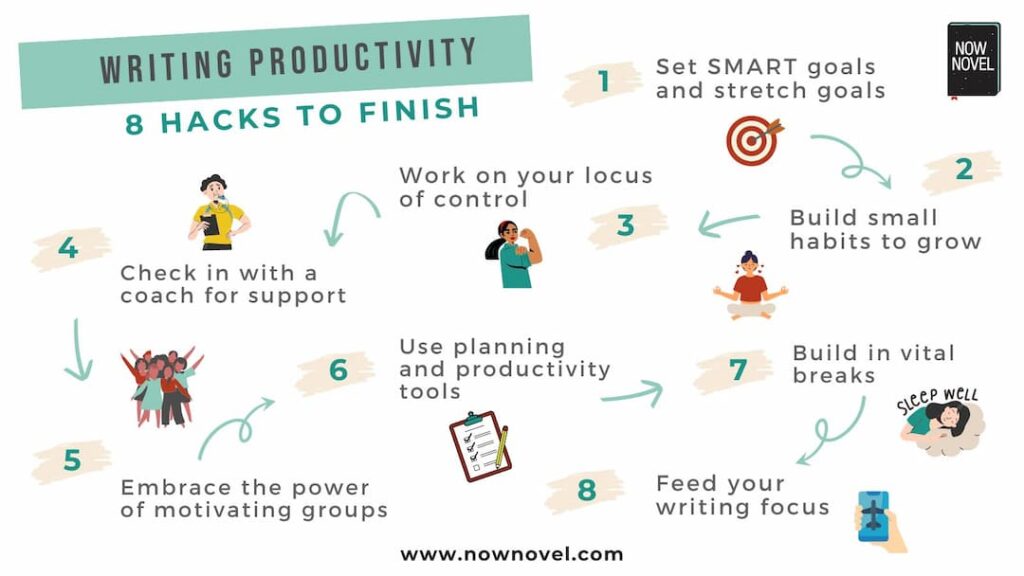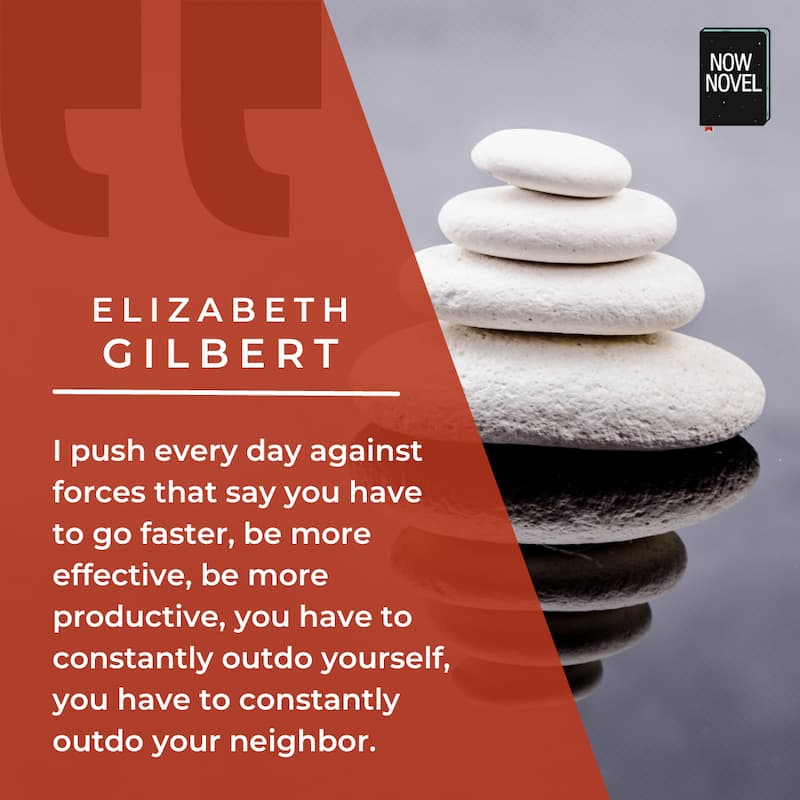The word ‘productivity’ sounds dry and technical, like something that belongs in a boardroom. Yet writing productivity – being able to create with the least possible stress and struggle – is what divides prolific from occasional authors. Let’s explore ideas about productive habits and ways to create more this year:
8 ways to write more, more often:
Explore ideas from behavioral science, authors’ interviews on process, and more:
- Set smart goals and stretch goals
Smart goals are specific, measurable, attainable, realistic and time-based. Stretch goals are the little bit extra you can reach if a writing session goes well.
- Build small habits
Small habits are easier to build than large ones. Writing fifty words every day for a week can become 500 words daily more easily than starting with a big and daunting target.
- Work on perspective and your locus of control
‘Locus of control’ refers to whether a person sees events as unfolding due to external forces more, or due to their own agency and action. Keep reading for more on how this connects to productivity.
- Check in with a productivity or writing coach
What athlete would make the Olympics without a coach spurring them on? Like athletics, writing requires incremental improvement for the long haul. A coach helps.
- Embrace the motivating power of groups and teams
Writing is a solitary pursuit but a caring writing group may help you sustain your commitment to your story. It’s easier to keep showing up together.
- Use planning and productivity tools
Calendars, spreadsheets, or a place where you record your daily writing streaks help you keep track of progress.
- Build in vital breaks
Build breaks into your writing routine – self-care keeps muses happy.
- Feed your writing focus
Ernest Hemingway would write ‘as soon after first light as possible’ when there were minimal distractions. How else can you build stronger focus?
Let’s explore each of these writing productivity ideas further, plus what ‘productivity’ really means.
What does productivity mean?
In Smarter Faster Better: The Secrets of Being Productive by Charles Duhigg, the author gives a succinct definition of ‘productivity’:
Productivity, put simply, is the name we give our attempts to figure out the best uses of our energy, intellect, and time as we try to seize the most meaningful rewards with the least wasted effort. It’s a process of learning how to succeed with less and less struggle. It’s about getting things done without sacrificing everything we care about along the way.
Charles Duhigg, ‘Introduction’, Smarter Faster Better (2016), p.3.
Want to write more this year with less struggle? Let’s explore those eight writing productivity hacks we touched on:
Set smart goals and stretch goals
We’ve chatted about the importance of goal setting for writing before (especially when you’re working on a piece as long as a novel).
To refresh, SMART goals are:
- Specific: Not ‘today I will write’ but ‘today I will write 500 words of my opening chapter’, for example.
- Measurable: A quantity you can measure progress against, such as word count or minutes/hours spent writing, uninterrupted.
- Attainable: Writing the first draft of a book of 50,000 words in a month? Doable, for some (ask NaNoWriMo winners). Writing the same in a day? Perhaps not attainable unless you are the world’s fastest typist.
- Realistic: Ground goals in what you are certain you can accomplish. Challenge yourself, too, but aiming small to start brings the big wins closer.
- Time-based: Time-based limits (such as writing for half an hour before a short break) give routine a rhythm, and helps to set productive parameters and avoid burnout.
Want more help setting writing goals for the year ahead?
Writing goal questionnaire example
Duhigg gives a simple questionnaire to fill out on SMART and stretch goals in his book on productivity. Fill out your own for the week or month ahead:
- What is your stretch goal? Example: I will draft my first three chapters of a new book project in one month.
- What is a specific subgoal? Example: I will write 500 words every day this week before I watch TV in the evening.
- How will you measure success? Example: By the end of the week I’ll have written 3500 words, approximately a draft of my first chapter.
- Is this achievable? Example: Yes, if I hit my target daily and compensate with extra words on remaining days for any days I don’t.
- What is your timeline? Example: One week.
Build small habits
Big habits start out small. That goes for bad habits, but fortunately for the good ones, too!
Writer and speaker James Clear has written about the power of habits, describing them as the ‘compound-interest of self-improvement’.
Writes Clear:
It is so easy to overestimate the importance of one defining moment and underestimate the value of making small improvements on a daily basis. Too often, we convince ourselves that massive success requires massive action.
James Clear, Atomic Habits: An Easy & Proven Way to Build Good Habits & Break Bad Ones (2018), p. 15.
Starting by writing fifty words every day is the stepping stone to writing five hundred or more daily.
One interesting suggestion Clear makes is to think more in terms of systems (the processes that can lead to the results you want, that work like compound interest in rewarding small investments of time and effort) than goals (which are focused on what you want to achieve, and not necessarily the processes you will establish to ensure you get there).
What’s a writing system you’ll test out this week? A series of planned actions, aligned to SMART goals?
Work on perspective and your locus of control
‘Locus of control’ is a helpful concept for understanding productivity in the context of creativity.
The term (conceptualized by American psychologist Joseph B. Rutter) refers to the degree to which people believe they have control over events in their lives (versus external forces holding the lion’s share of power).
Keeping productive (not just in writing) comes easier to people when they believe in their own agency, in the power of actions they take to create the outcomes they want.
Imagine two writers, Arnold and Bella:
- Writer Arnold: ‘I want to write but it will be hard and who knows if anyone will like the end result and buy my book’.
- Writer Bella: ‘I want to write and because it will be hard I will keep myself focused by joining a daily writing sprint. To ensure there’s a market for what I’m writing, I’ll do some market research and read within my genre.’
This is of course an oversimplification but the comparison is clear.
Arnold may steer towards giving up on their dream to write, perhaps, due to doubt and allowing factors beyond their control to be primary factors in determining outcomes.
Bella focuses on what is within her control, and this line of strategy gives concrete actions to take, instead of focusing on potential obstacles. There’s a through-line from issue to solution.
Developing a more decisive locus of control to write
So how can you work on developing a productive, action-oriented locus of control?
- Write out affirming statements in the form, ‘I want to [desire] and [anticipated challenge], therefore I will [action]. For example, ‘I want to write a book set in Tudor England and I know little about the time, therefore I will research the era in British historical archives and read well-reviewed novels set in the time.’ This may be productive to do before you sit down to draft a chapter.
- Systematically evaluate your choices: What is within your power, truly, in this creative project? What is beyond it? It helps to be clear on the difference – then you can act.
- Ask for help: If you struggle with creating the systems and accountability to stay productive, ask for help. A writing buddy or coach can hold you accountable with kindness and thoughtful, measured input.
Check in with a productivity coach or writing coach
A productivity coach is someone who helps you attain the goals you desire by helping you to establish the systems necessary to get there.
A writing coach does similar through a combination of discussion about your work and ideas, feedback on writing identifying improvement areas and providing stimulating questions and/or suggestions, and encouragement and support when you most need them.
Author Nerine Dorman described herself regarding coaching authors as a ‘combination of pep-talk-cheerleader and your personal pet editor’. It’s a good description of the mix of practical utility and less tangible camaraderie and support a coach provides.
To make tangible progress on your story over six months in a structured curriculum, see our Group Coaching author program.
Embrace the motivating power of groups and teams
In Smarter Faster Better which we discussed above, Charles Duhigg devotes an entire chapter to the productivity benefits (and challenges) of teams and group work. Writing circles and groups all over the world are a testament to the fact that we often write more, together.
Duhigg explores case studies of organizational behavior and comes to the subject of ‘psychological safety’. Some groups fall apart due to difficult power dynamics, or a culture of shame and silencing.
In effective groups and teams:
Teams succeed when everyone feels like they can speak up and when members show that they are sensitive to how one another feels.
Duhigg, p. 65.
This is the broad generalization that describes how people respond when there is ‘psychological safety’ – people are permitted to take risks, they have a voice, and caring sensitivity takes punitive repercussion’s place.
How does this all relate to productive writing? The best writing groups provide a safe place to find something like beta readers who are writers, too. A place to renew your focus through productive discussion.
When you release work into the ‘wild’, you don’t always get a chance to hear what readers think before it’s a ‘DNF’ (did not finish) review on Goodreads.
Writing groups that are run ethically and thoughtfully provide a space to test ideas, commit and re-commit to your writing goals, and build confidence in your writing in an open, mutually caring and honest space.
Use planning and productivity tools
Your story planning tools may be as simple as a calendar to set alarmed reminders for writing sessions or sprints, or a more complex system.
One thing Now Novel members often share is that having a structured plan for a story may feel like more work upfront, but can ultimately spare agonizing ‘what next’ moments (or total remodeling) later.
Having at least some idea of what will happen, when – the scope and shape of your story – needn’t be limiting. You can depart from a plan – a hand rail may be the support you need for more adventurous parkour.
For a free Google Docs template including a built-in writing project planner, see our complete guide to story planning.

GET YOUR FREE GUIDE TO SCENE STRUCTURE
Read a guide to writing scenes with purpose that move your story forward.
Learn moreBuild in vital breaks
A big paradox of productivity – in work, in writing, in all endeavors – is that stepping back is sometimes the best way to move forwards.
In planning smart goals and stretch goals, writing sprints and sessions, remember to build in breaks. Not writing is not necessarily not writing. Even while pen isn’t to paper (or fingers to keyboard), you may well be working on story ideas, characters, scene set-ups, in your mind’s eye. Dame Christie said the best time to plan a story was while doing the dishes.
Burnout is both easy to reach and easy to avoid. If you don’t want to stop writing entirely, you could always journal or work on a different phase of a different story project for a refreshing change.
Feed your writing focus
What are the ingredients of better productivity in writing and other endeavors?
- Motivation: The will or desire to do.
- Focus: The concentration necessary to keep paying attention to what you’re doing and sustain stamina.
- Intention: Knowing and deciding what you want to do and why.
- Discipline: Being strict with yourself so that you continue to show up for a dream you want to achieve, a story you want to tell (or that wants you to tell it – stories have a way of taking over like that).
Smart goals, stretch goals, and getting help from a coach or accountability partner all help with motivation and discipline, yet what about focus?
To build focus to write:
- Identify your best environment: Do you need the low hum of background noise, for example, or as much quiet as possible? Invest in earplugs.
- Eliminate distractions: Turn your phone onto airplane mode if necessary. It’s amazing how one notification can lead you down a half-hour, social-media-scrolling rabbit hole.
- Schedule focused time: Showing up at a regular time builds in the habit that will help you write more and stay productive.
See what Hemingway says about making time to write – his routine ticked many of the above boxes:
When I am working on a book or a story I write every morning as soon after first light as possible. There is no one to disturb you and it is cool or cold and you come to your work and warm as you write. You read what you have written and, as you always stop when you know what is going to happen next, you go on from there. You write until you come to a place where you still have your juice and know what will happen next and you stop and try to live through until the next day when you hit it again.
Ernest Hemingway, interviewed by George Plimpton in ‘The Art of Fiction No. 21, Spring 1958.
How are you going to stay productive and write this year? Let us know in the comments. Learn more about how a structured writing course will help you make real progress.





